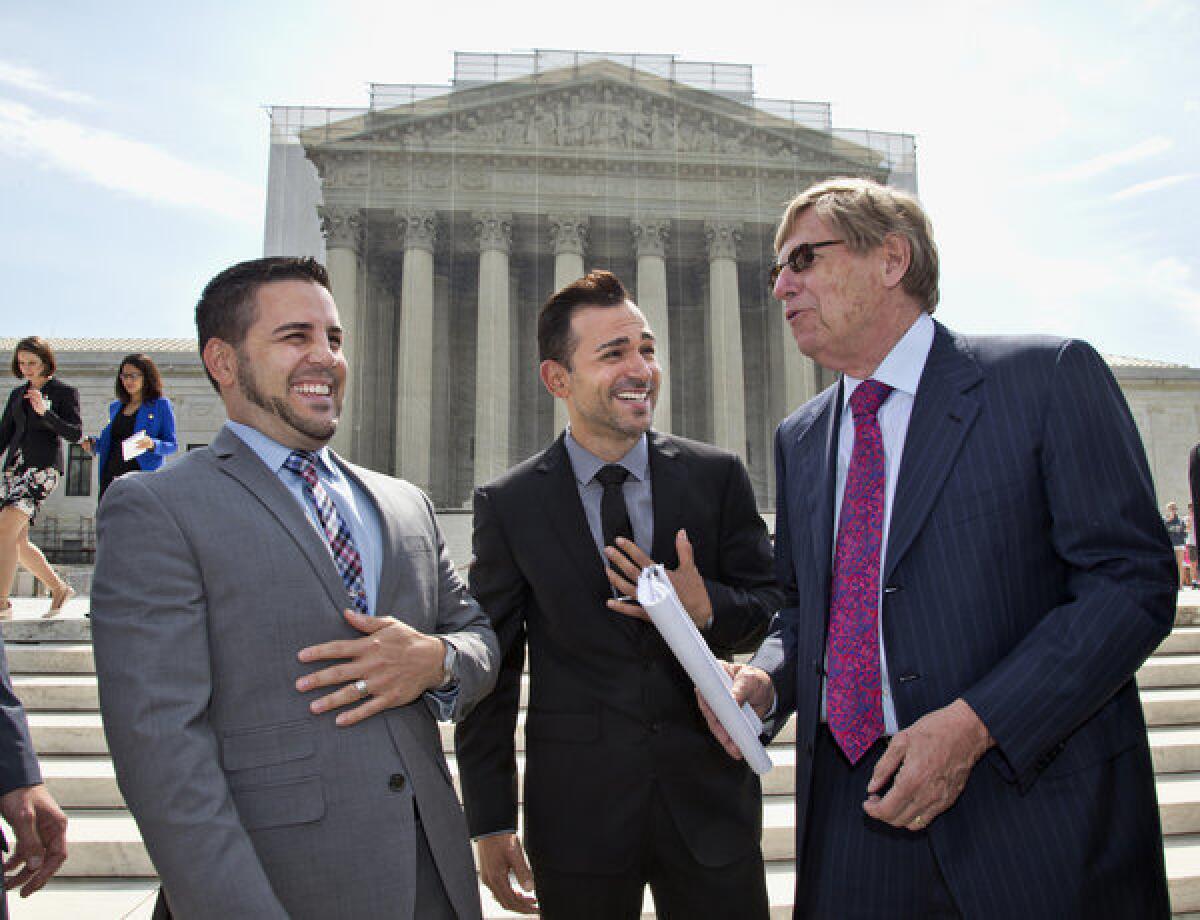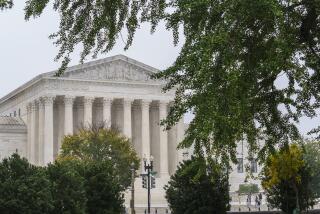Might Justice Kennedy spring a surprise on DOMA?

Despite the conservative tilt of the Roberts Supreme Court, gay rights supporters expect the justices to strike down the Defense of Marriage Act this month. Their hopes are pinned on Justice Anthony M. Kennedy, the court’s usual swing vote, who has written two important pro-gay-rights opinions in the past and voiced skepticism of the law during the court’s hearing in March. If he joins the court’s four liberals, DOMA is history.
Kennedy, however, could surprise the court watchers. His record on gay rights is hardly uniform. In 2000, for example, he voted to allow the Boy Scouts to exclude gay scoutmasters. And even his pro-gay-rights rulings, which are undoubtedly significant milestones for expanding liberty for the LGBT community, have been written in such a way as to reduce their scope and impact.
Kennedy’s opinions have carefully avoided putting discrimination on the basis of sexual orientation on par with racial and gender discrimination. His rulings are filled with caveats and qualifications. Indeed, after surveying Kennedy’s opinions, a federal appeals court upheld a ban on gay adoption, saying nothing in his rulings demanded otherwise.
TIMELINE: Gay marriage chronology
Even at oral argument, Kennedy did not seem comfortable embracing the notion that the Constitution’s command of “equal protection of the laws” mandated DOMA’s invalidation. That was the view expressed by Justices Elena Kagan and Ruth Bader Ginsburg, but Kennedy was having none of it. His objections were rooted instead in states’ rights. The federal government, he suggested, has no business defining marriage, which is traditionally left to the states.
This federalism objection to DOMA, however, has little case law to support it. In fact, the cases go the other way. The court has consistently held that the federal government has broad discretion over how it spends money, and it’s inevitable that federal programs define who is eligible to receive benefits. It’s Congress, not the states, that determines who counts for tax purposes as a “dependent” or an “employee,” so why not “spouse”?
And it’s hard to argue that DOMA has prevented states from defining marriage for themselves. Since DOMA was enacted in 1996, nearly every state has adopted laws defining marriage — most limiting it to one man and one woman, while a significant minority has expanded the definition to include gay and lesbian couples. No state has any inherent right to dictate how the federal government doles out federal benefits.
FULL COVERAGE: Prop. 8 and DOMA
Perhaps that’s why speculation has recently turned to the possibility that Kennedy, instead of voting to strike DOMA, might decide the case on narrow procedural grounds that leave the basic constitutionality of DOMA unresolved. In this scenario, he’d join with the court’s conservatives, rather than the liberals, to rule that neither the Obama Justice Department nor the House’s Bipartisan Legal Advisory Group had standing to defend the law.
With no appropriate party defending the law, there would be no sufficient “case or controversy” on which the court could rule. The decisions in the court of appeals holding DOMA unconstitutional would be vacated and DOMA would survive to see another day.
Finding that the Bipartisan Legal Advisory Group lacks standing is easy. Although there’s precedent for allowing Congress as a whole to participate in litigation, the Senate did not agree to join or authorize the creation of the group. Never before has the court permitted a group of lawmakers from a single house of Congress to defend a statute — and few of the justices defended the group’s standing at oral argument.
Usually, the Department of Justice automatically has standing to defend a law on behalf of the United States. Indeed, in the ordinary case, that’s the department’s role. Yet Eric H. Holder Jr., President Obama’s attorney general, announced in 2011 that Justice would no longer defend the law in court. Although the government would continue to respect the law in practice — and thus still deny recognition of gay marriages — it argued DOMA was unconstitutional. The trial court in the case now before the Supreme Court agreed.
And that’s the problem. Arguably, the United States is a “prevailing party” under the law, and thus not entitled to appeal the trial court’s decision. Therefore, there aren’t two adverse parties, and the court lacks jurisdiction to hear the case.
To non-lawyers, these may seem like picayune distinctions. Such line-drawing, however, is the very life of the law. The justices are certainly interested in these questions, even going so far as to appoint, on their own, a lawyer to make the argument that the court lacked jurisdiction to hear this case.
If the DOMA case is decided on narrow procedural grounds, it may take years before the law returns to the high court. There would probably be many challenges in the lower courts, but none could be appealed unless the challenger lost. Given the administration’s refusal to defend the law — and the number of Republican-appointed judges who’ve previously voted to strike down DOMA — such a case might not arise very soon.
The administration would be caught in a tough spot. While Obama could decide not to enforce DOMA at all, this would be awkward given the administration’s claims for the past several years that it was obligated to do the opposite. It also might raise constitutional issues of its own, as the text requires the president to “take care that the laws be faithfully executed.” House Republicans would love to have another reason to rattle the impeachment saber.
Failing to enforce DOMA would also set a dangerous precedent. Would a President Rubio be able to declare Obamacare unconstitutional and refuse to enforce it? And while advocates of gay rights, like me, might be pleased in the short run, imagine the disappointment when the next Republican president announces that DOMA is once again good law.
In oral argument, Chief Justice John G. Roberts Jr. wondered why the president “doesn’t have the courage of his convictions” and simply stop enforcing DOMA. If the chief justice and the court’s other conservatives persuade Kennedy to join them on a narrow, procedural ruling that leaves DOMA standing, we may find out precisely how courageous — or, depending on your view, imperious — Obama can be.
Adam Winkler is a professor at UCLA School of Law and the author of “Gunfight: The Battle Over the Right to Bear Arms in America.”
More to Read
A cure for the common opinion
Get thought-provoking perspectives with our weekly newsletter.
You may occasionally receive promotional content from the Los Angeles Times.






